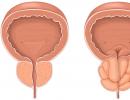Symptoms and treatment of low blood pressure
Until recently, low pressure was considered the least dangerous condition than high. Today it has been proven that hypotension carries the same danger to the body as hypertension, requiring increased attention to treatment and diagnosis.
Description of the disease
Hypotension or low blood pressure is a state of the body in which blood pressure falls below the values that are observed in a normal state for a person. According to official medicine, the pressure is below 100/60 mm. rt. Art. - low.
In this case, it is impossible not to take into account the individual characteristics of each person. For example, in the case of the predominance of the parasympathetic nervous system and a tendency to hypotension, a person may feel normal at a pressure of 90/60 or lower.
If a person's value rises to normal levels, then his general condition and well-being are disturbed.
True hypotension - this is a pathological decline in pressure to levels below normal. As a result of a decrease in the tone of the vascular system, blood circulation slows down. All this leads to a deterioration in the supply of oxygen to organs and systems.
Symptoms of low blood pressure include constant weakness, fatigue, drowsiness, excessive sweating, dizziness, and headaches. This leads to a decrease in mental efficiency.

Why is the pressure dropping?
Most often, women suffer from low blood pressure and, as a rule, the tendency to the disease is inherited and is noted from an early age. Usually such children are inactive, lethargic and quickly get tired after outdoor games. Adult hypotensives are usually tall and light weight.
The questions of hypotensive patients are answered by the doctor in the program of Elena Malysheva “Live healthy!”
The main reasons for low blood pressure include:
- strong psycho-emotional stress;
- immobility;
- work in hazardous conditions (work underground and subject to high temperature or low humidity);
- diseases of the nervous and cardiovascular systems, thyroid gland;
- disruption of the respiratory system, adrenal glands.
Due to low physical activity, the work of the heart and ventilation of the lungs worsens, mineral and protein metabolism is disturbed. A person quickly gets tired, becomes lethargic, he wants to sleep.
It is not uncommon to meet athletes with low blood pressure. Hypotension and a rare pulse, as it turned out, are a protective reaction of the body to regular physical activity.

The main symptoms of low blood pressure are
- weakness and lethargy, weakness and malaise;
- and vomiting;
- headache in the occipital or;
- feeling short of breath, especially in a crowded place, constant yawning;
- shortness of breath, increased sweating;
- when changing from a lying position to an upright position,
- darkening in the eyes;
- health deterioration during magnetic storms and weather changes;
- poor memory, distraction;
- tendency to depression, emotional instability,
- irritability, sudden mood swings;
- due to reduced vascular tone, pain in the heart and behind the sternum, palpitations may occur;
- seldom - ;
- numbness, cold hands.
If these symptoms appear, you should consult a doctor.

What is the danger?
One medical proverb says: "In youth - hypotension, in old age - hypertension." With a long existence of low pressure, the human body tries so hard to reach standard values, which leads to the development of already hypertension, even at a young age.
Low pressure may also indicate a malfunction of the autonomic function of the nervous system, as well as diseases of the gastrointestinal tract, myocardial infarction in the acute phase, adrenal or thyroid dysfunction, anaphylactic shock. At the same time, it is hypotension that is the main symptom of these diseases.
In the event that the autonomic reactions of the nervous system are disturbed, signs of hypotension may be as follows:
- sudden loss of consciousness;
- deterioration of memory and brain function;
- poor coordination of movements;
- decreased vision;
- heart disorders;
- poor resistance to physical stress.
If hypotension is a primary phenomenon without signs of other diseases, then most likely this is a consequence of vegetative-vascular dystonia. In the event that the pressure drops due to the underlying disease, this is very dangerous. In such a situation, you can not hesitate to visit a doctor.

Low blood pressure and pregnancy
Very often, low blood pressure occurs in pregnant women. There are two options here:
Hypotension that occurred before pregnancy. It may continue even after it occurs. In this case, she does not bear any harm to the expectant mother, but threatens with various complications for the unborn baby. Due to hypotension, blood circulation is disturbed, which negatively affects the child. There is a risk of hypoxia and subsequent complications.

Pregnancy is the only cause of hypotension. This happens with toxicosis of the first trimester. And also it can be a sign of uterine bleeding and the threat of miscarriage.
Low blood pressure treatment
Low blood pressure is treated by a cardiologist, and sometimes a neurologist. Taking into account the indications, they prescribe drugs and the necessary medical measures. Treatment is individual for each patient. Self-medication will only worsen the patient's condition.
Drug treatment of hypotension consists in the appointment of drugs based on caffeine, as well as herbal drugs of a stimulating nature.
Morning coffee, outdoor walks, exercise, swimming, contrast showers, good rest are considered useful. It is known that hypotensive patients should sleep for more than 8 hours in order to feel well-rested.

It is recommended to alternate rest and physical activity, not to overwork. Effective at reduced pressure is massage and. Physiotherapeutic procedures such as magnetotherapy, cryotherapy and gravitational therapy are also useful. They have a beneficial effect on blood circulation and increase vascular tone.
Herbal preparations with a tonic effect are used in the treatment of hypotension: tinctures of ginseng, eleutherococcus, magnolia vine, hawthorn and other medicinal herbs. Only a doctor prescribes them.
What to do with low pressure?
If hypotension is caused by some disease, it should be treated first. In the event that low blood pressure occurs on its own, the following recommendations should be borne in mind:
- Try to stick to a daily routine in which at least 8 hours of sleep will be allocated. In case of sleep disturbance, it is necessary to consult a psychotherapist for the appointment of medication sedatives.
- After waking up, you can not get up abruptly, as there is a risk of collapse, loss of consciousness. Light exercise is needed in bed, by bending and unbending the limbs, turning the head. Only then can you take a sitting position and stay in it for 1-2 minutes.

- Engage in water procedures and hardening. A contrast shower is recommended with a gradual decrease in water temperature.
- Lead an active lifestyle, play sports.
- Do morning exercises for at least 10 minutes.
- In the morning there should be a full breakfast and sweet coffee. Meals throughout the day should be complete.
- Use medications, among which caffeine-sodium benzoate, citramon, tincture of ginseng and eleutherococcus, Chinese magnolia vine, pantocrine are known. Their systematic use will help to slightly increase blood pressure.
If the pressure drops sharply
With a sharp decrease in blood pressure, the following urgent measures should be taken:
- lay the person down by raising his legs;
- put the head so that it is lower than the body - this will improve the inflow
- blood to the brain
- massage the neck, put a cold compress on the forehead.
Usually these measures are enough to restore normal pressure. Otherwise, urgent hospitalization is needed to rule out dangerous diseases.

Conclusion
With low pressure, it is recommended to spend free time in motion, play sports. During physical activity, organs and systems are better supplied with oxygen, and after them, sleep becomes stronger and healthier. In the morning, a person begins to feel more cheerful.
Eat regularly and avoid overeating. The latter entails an excessive expenditure of energy due to the stress of the digestive processes. If it is possible to sleep during the day and the person does not have nocturnal insomnia, it is recommended to rest at lunchtime.
It is also necessary to give up bad habits, do not smoke or drink alcohol. It is most beneficial for the body to devote more time to a healthy lifestyle.
If you need to consult a doctor, you can ask a neurologist a question for free.
In contact with






